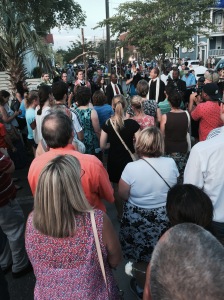Happy Hurricane Season.
We are still reeling from Harvey, remembering the anniversary of Katrina, and looking over our shoulder at Irma.
Hurricane season. The time of year when many of us get to gamble about whether to stay or whether to leave, whether to be foolish or brave. Time to face that, no matter how much we hate our neighbor, it just may be his generosity that pulls us out of the flood.
I’ve been doing a lot of hating on my neighbors lately.
Not necessarily my literal neighbors – although the 3 am revelers get special curses – but my metaphorical neighbors who proudly and defiantly still support the other guy.
I have even more special curses for them and for their stupidity. Why they would vote for someone who bragged about grabbing pussies, who clearly and demonstrably lied every time he opened his mouth, is beyond me. No time to talk to people that stupid.
I don’t suffer fools well.
When I was in public relations, I had a client – let’s just say they were concerned with mental health – that never wanted to use language that they called “blaming and shaming.”
I got where they were coming from – those who had mental health issues had enough to deal with without stigmatizing language. So, I carefully wrote language that talked about “people with mental health challenges” as opposed to “schizophrenics.” It is the kind of language that has come up with the tongue-twisting “differently-abled” instead of “disabled” or “handicapped.”
And, while I wrote this stuff – they were the client, they paid the bills – I secretly sneered. In real life, I’m all about the blame and shame.
Call a spade a spade. Idiots are idiots, and life’s too short.
But here’s what I see on Facebook:
–people on BOTH sides spreading fake news
–people on BOTH sides getting angry about things that don’t matter (okay, admittedly bad optics, but does it really matter that Melania wore heels to Harvey? Really?)
–people on BOTH sides slinging insults (Libtard, Trumptard, etc.) and just not listening.
And, I get it. Yes, call a spade a spade. A racist is a racist is a racist. It shouldn’t matter why.
Except, it does. Because just shaming and blaming does nothing to change things. It’s not like a racist is going to see my scorn, slap his head in dismay, and realize that he has been mistaken his whole life.
And, I realize that I have the white privilege to just scorn something that doesn’t affect me personally.
Still…
That client liked to change my language from using, “but” to using “and.”
“Different things can co-exist,” she used to say.
People can vote their self-interest AND still sacrifice to save others during a hurricane. People can have a fundamentally different mind-set AND still be lovable.
So, it’s hurricane season.
Maybe it’s time to wash away all the shit we’ve been wading in since November. To pull our neighbors out of the flood of invective. To hold out a hand and say, “Hi, I’m differently politically-abled than you are. Want a seat in my boat?”


